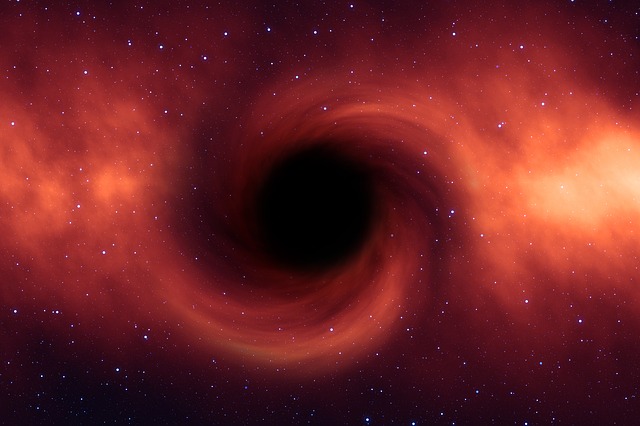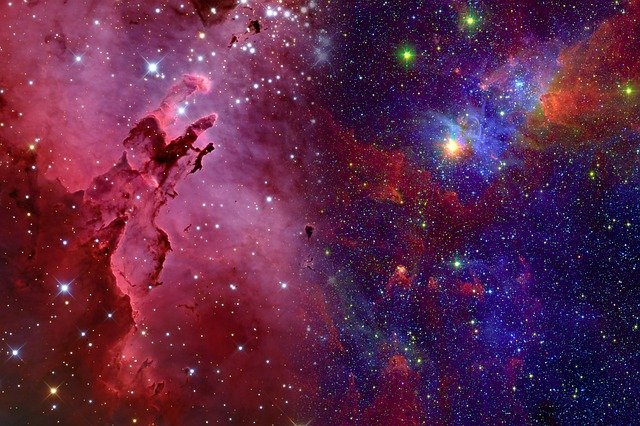*This post may contain affiliate links. This means we may make a commission if you purchase an item using one of our links*
Black holes and dark energy are very different from one another as black holes are the densest entities in our universe and come in varying sizes whereas dark energy is simply the energy that makes up 68% of our universe and is responsible for its expansion.
For a more detailed look at each entity, continue reading as it will be covered in more depth throughout the remainder of this article.
What Is A Black Hole?
Table of Contents

Black holes are areas of space where gravity is so strong that not even light can escape them. The reason for this immense gravitational pull is that a large amount of mass is squeezed into a tiny volume. And these mysterious entities fascinate people because they challenge our ideas of time and space.
When a massive star (one that has at least eight times the mass of our Sun) runs out of fuel, it begins to die; at this stage, the star collapses in on itself, creating a concentrated area of mass known as a stellar black hole.
Not all stars become black holes; some expand into red giants. But for those that are large enough, the core begins to collapse. First, the innermost layers are pulled into the center, followed by the outer layers. But after the initial collapse of the outer layers, they bounce back out into space as a supernova explosion.
At this stage, all that remains is the core. If this compact center possesses three solar masses or more, it can continue compacting to smaller and denser volumes. As this happens, gravity and escape velocity increase until the core becomes a black hole.
Escape velocity is the minimum speed an object must travel to escape the gravitational field of a planet or other body. The escape velocity of Earth is 11.2km/s – or 40,000 km/h – which sounds like a lot but is nothing compared to a black hole. Here, even light traveling at over one billion kilometers per hour cannot escape!
Not all black holes are stellar black holes; the most giant black holes in existence are called supermassive black holes and possess masses that equal more than 100 times that of the Sun. Scientists believe every galaxy has one of these black holes at its center, which likely formed during the initial phases of the big bang.
Because black holes suck in all matter, including light, they are entirely invisible. But, scientists can observe them by monitoring the effects of gravity on the stars and gas around the hole.
What Is Dark Energy?

Dark energy is a hypothetical form of energy that permeates all of space and accelerates the Universe’s expansion. The term “dark” refers to the unknown rather than a physical characteristic of the matter. And scientists believe that this energy could make up as much as 68% of our Universe.
The existence and properties of dark energy are inferred from its gravitational effects on the matter and radiation in the observable Universe rather than from direct detection.
Dark energy is one of two hypothesized forms of energy that constitute what physicists call “the cosmological constant.” The other form is dark matter, which does not interact with electromagnetic radiation like light.
The discovery of dark energy was made possible by observing different supernovae in distant galaxies and calculating their distances from Earth to measure how fast they were moving away from us. Dark energy helps scientists to explain what causes this acceleration.
Scientists have observed that galaxies are moving away from one another at an accelerating rate. They have tried to explain the acceleration by looking at the gravitational pull of visible stars and gas. However, they discovered that even if there is a lot of dark matter, it would not be enough to account for the observed acceleration.
This is why they believe there must be some other form of matter, which we cannot see, out there in space, causing this acceleration. Scientists believe that dark matter exists because it helps explain our Universe’s rapid expansion.
Are Black Holes Made Of Dark Energy?
Black holes are extremely dense pockets of matter that do not allow any form of light to escape its clutches whereas, dark energy is a hypothetical form of energy that makes up the majority of our universe and accounts for how our universe is expanding.
Taking this into account, as black holes are formed by physical matter as opposed to energy (which is an area that we have only barely begun to understand) and as far as we know, black holes are formed by matter generated by physical entities like supermassive stars. Therefore, black holes are not made up of dark energy or dark matter for that matter.
Differences Between Black Holes And Dark Energy
In regards to the differences between the two, they include the below:
- Black holes are created after the death of a supermassive star that satisfies the mass requirements of said star whereas dark energy is an hypothetical energy that makes up the majority of the Universe and is likely responsible for its expansion
- Dark energy makes up roughly 68% of our universe while black holes are far less present throughout our universe, with roughly 10 million to 1 billion present in just our Milky way alone.
- Dark energy accelerates the expansion of the Universe while black holes do not.
- Black holes are able to warp space and time around them.
- No light can escape the center of a black hole.
- Black holes have a theoretically infinite lifespan whereas dark energy is an infinite entity as long as the Universe continues to expand.
Summary
Although both are a part of the same Universe, with one making up the majority of it while the other being a product of the activity happening within it, they are of course functionally very different from one another.
Black holes are made from extremely heavy matter that has collapsed into itself and can expand in size the more stars they consume whereas dark energy is a hypothetical form of energy that is theoretically responsible for why the universe continues to expand day by day.
This is why despite being very dark entities in their own right, black holes and dark energy don’t have all that much in common.

